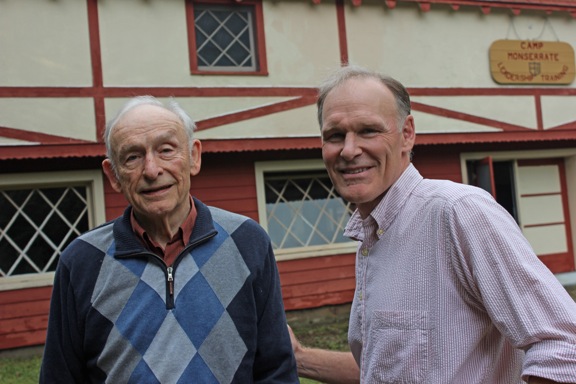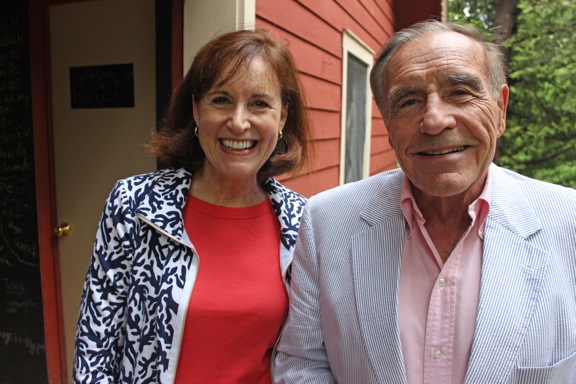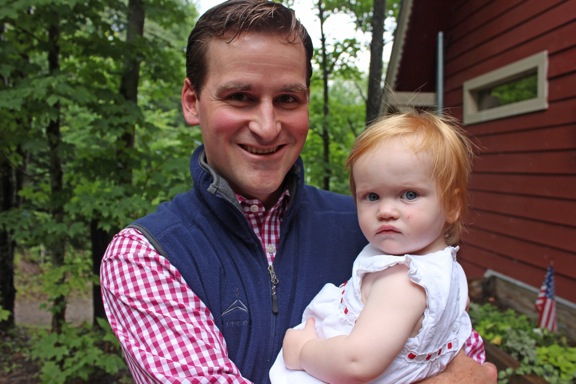ON THE SCENE: Walking one’s talk

Paul Jacob Reiss (Julian’s son) and long time chair of the Julian Reiss Foundation with his son Paul Julian Reiss, current chair standing in front of the former Old McDonald’s Farm barn, now used as a center of activities for Camp Monserrate (Provided photo — Naj Wikoff)
Locally, Julian Reiss is perhaps best remembered for creating Santa’s Workshop, the first and longest continually operating theme park in the United States, but there was far, far more to the man than that one achievement.
He was a national leader in the fight for civil rights who was called on numerous times by his government to lead civil rights initiatives. He was also a person who put his beliefs into actions in his own businesses, for example, through establishing a profit sharing plan with his employees in the 1940s, decades before others.
His more enduring legacy is, first and foremost, the spirit of altruism carried on by his children, grandchildren, and now great grandchildren, followed by the foundation and initiative he launched 60 years ago to provide inner city youth a new lease on life – an effort inspired by his love and understanding of the healing benefits of the Adirondack experience – a program carried forth by his offspring. The program here was initially called Camp Monserrate.
Julian Reiss died young, but what has not died is the impact he has had on countless youth through many of his initiatives. If you have never taken your children or grandchildren to Santa’s Workshop on the side of Whiteface – take them. Yes it’s quaint, dated, and has none of the razzle dazzle of contemporary attractions the world over, but as far as your kids are concerned the magic is still very much there.
In the 1950s, Santa’s Workshop had cars lined up all the way down to the Wilmington village center. This success inspired him to try another, Old McDonald’s Farm located down behind Placid Pond plaza on Saranac Avenue. The farm had hayrides, lots of farms animals for kids to pet, and popular square dances held in the barn, with kids often sitting in the rafters shaving wax that would land on the floor below to be polished into the wood by the dancers’ feet.

Cathy Reiss and her Uncle Peter Reiss (Provided photo — Naj Wikoff)
Fun though it was, the attraction was not a success and Julian was already working on converting it to another manifestation with kids at its center, this time though with a very different purpose.
Julian realized that living in the Adirondacks provided he and his family a very healthy lifestyle, and a place to relax and renew their physical, emotional, and spiritual wellbeing – a benefit he knew well as he first arrived to “take the cure” as he was living with TB.
He felt inner city kids would benefit from a similar experience, and began laying the plans to convert the farm into a summer camp for inner city boys, many from Hispanic backgrounds. Knowing full well the not-in-my-back-yard thinking of many well meaning Americans, be it the location of a prison, a place for the emotionally handicapped, a waste water treatment plant, they decided to be a quiet about this new venture – at least until relatively recently.
During the set-up stages, Julian died (1959), but not his dream as his son Paul agreed to carry it forward. Paul and his team initially realized that the participants, most especially needed to learn how to speak English, and that the benefits of being here for four to six weeks, great though they were, would diminish if the kids had no follow-through or similar support structure when they returned home. So he went looking for a partner agency, found one, which initially lead to their creating a middle school in New York. Since those beginnings the program has moved to the Hunt’s Point section of the Bronx, the second poorest congressional district in the nation. Later a parallel program for women was launched led by Paul’s daughter Cathy. Once a kid enters either program, they stay with him or her right through their college graduation with many going on the successful careers. So successful has been the program, which brings about 60 boys and 60 girls each summer to Placid, that it has inspired over sixty-five similar programs throughout the nation.
As for the not in my backyard, significant is all these campers are literally in the Reiss family’s backyard as many of the kids and some grandkids have seasonal homes in and the land that once hosted Old McDonald’s Farm. Paul Reiss has passed on leadership of the foundation to two of his kids and one grandchild, while much of the extended family is involved in various aspects in one form or another while others have engaged in other service that would make Julian Reiss very proud.

John Reiss, a board member of the Julian Reiss Foundation (Provided photo — Naj Wikoff)
Also important to realize is to the extent that the family, from Paul and his wife Rosemary on down, are involved in so many aspects of what makes Lake Placid special – the Lake Placid Sinfonietta being but one such example. Sometimes that spirit of humanity is very quietly done – Jay Rand Sr., who struggled with the outcome of battle fatigue (PTSD) – from his WWII service – was provided the challenge and opportunity to design and create an interfaith chapel on Camp Monserrate grounds. Used by family and campers alike, this simple but beautiful jewel enabled Rand to leave a legacy of his own providing proof positive of where the artistic abilities of several of his own children and grandchildren came.
“The motto of program pretty much says it all, ‘Opportunity is Nativity’s gift to you, what you do with that opportunity is your gift to Nativity,'” said Paul Reiss. “We have graduates doing that in many different ways.” Paul went on to describe how graduates of their programs for inner city kids have returned as counselors, volunteers, contributors, and of the many successes they have had in life and in their careers – a spirit of generosity mirrored by he and his sisters and brothers, and their children and grandchildren. Their original partner, the Nativity Middle School eventually closed as an outcome of changing demographics, now they partner with St. Ignatius School in the South Bronx and other programs.
On Saturday the extended Reiss family gathered in the former barn of Old McDonald’s Farm to celebrate the 60th anniversary of the Julian Reiss Foundation and in so doing educate the younger generation about their spiritual and ethical inheritance.
“It takes four or five of us to do the work that my father did alone for many, many years,” said Paul Julian Reiss, now chairman of the Julian Reiss Foundation. “It’s just a question of carrying on the good work the foundation was set up to do, and it would be a shame to lose that. It’s just a matter of giving back all that we have been given, and to be able to enable some kids from the city the ability to enjoy the Adirondacks as we have done. The kids come from a neighborhood of gunfire and prostitutes in the street, and here they are scared of the sound of the owls and bullfrogs. They don’t know what they are. They haven’t seen stars at night before or experience a night without light. It’s great to have them see that there are other worlds out there where you don’t have to have that street edge and can let down your guard.”
“The whole culture difference was a big shock to me,” said Chris Reiss who served as a camp counselor last year (Paul Jacob’s son). “It made me realize what I take for granted. A lot of them don’t have fathers back home. They don’t have the family support that I do. Coming here gives them a family. The pool was a shock to them. They thought they were going to just play around, not that they would learn how to swim. I look forward to seeing them again.”
“The camp open horizons for them,” said John, a member of the board. “It shows them that there is a whole other path to the world.”
“I’ve learned humility, that not everyone sees they way I see, and at times I am missing a lot that they see,” said Fr. Jack Podsiadlo, former director of the Nativity School about what he learned from the participants at Camp Monseratte. “You also can say to them, you’ve climbed Mount Marcy, the highest mountain in the state, what other mountains can you climb? What mountains can you climb in math class? What mountains are you going to climb in reading?”
- Cathy Reiss and her Uncle Peter Reiss (Provided photo — Naj Wikoff)
- John Reiss, a board member of the Julian Reiss Foundation (Provided photo — Naj Wikoff)





